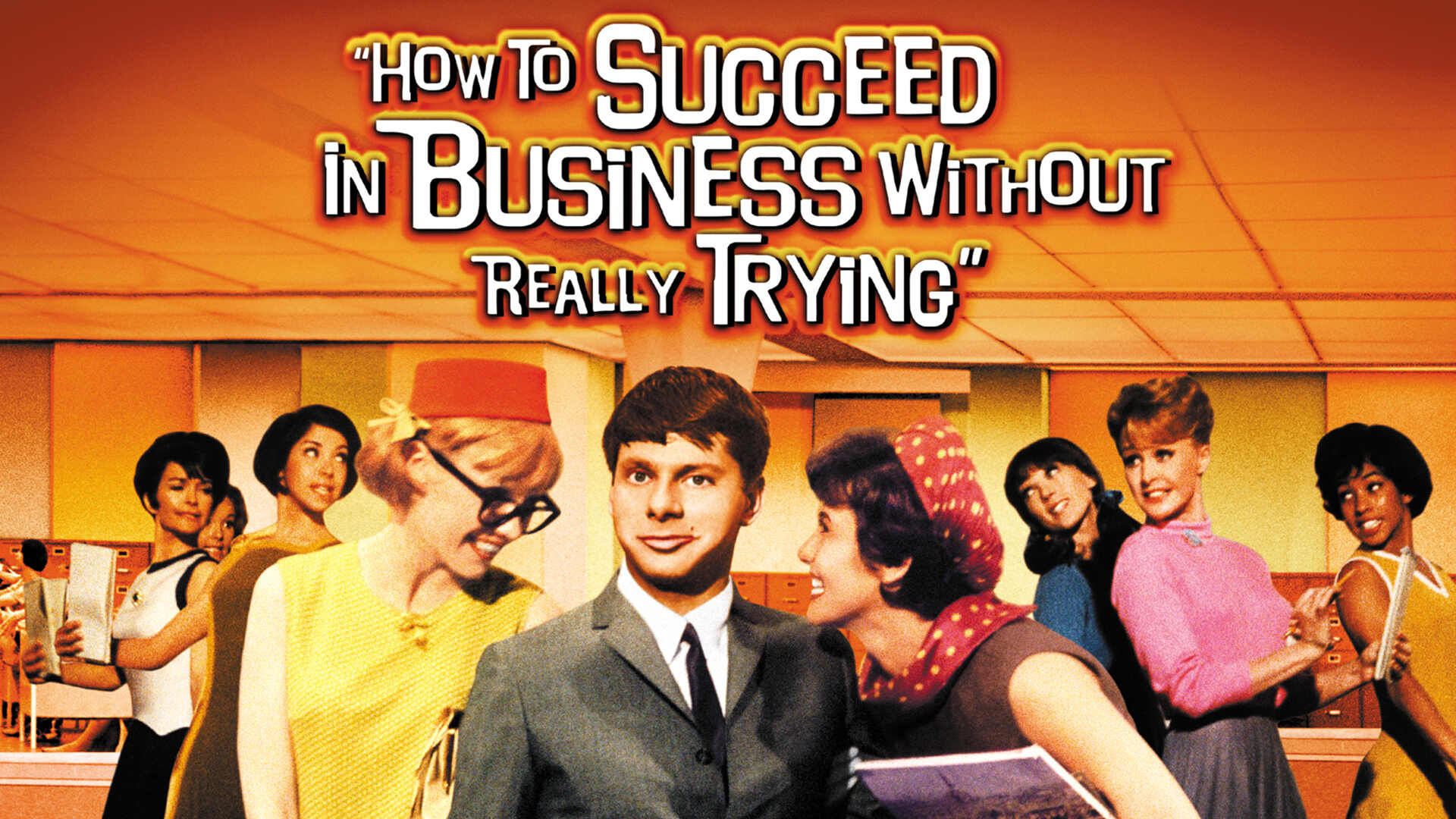
Released in 1967, "How to Succeed in Business Without Really Trying" is a classic musical comedy film that continues to captivate audiences with its timeless charm. Based on the Pulitzer Prize-winning Broadway production, this movie follows the ambitious window washer J. Pierrepont Finch as he navigates the cutthroat corporate world with wit and determination.
Now, let's delve into 33 fascinating facts about this beloved film, from its inception to its enduring legacy. Whether you're a die-hard fan or a newcomer to the world of corporate satire, these insights will offer a deeper appreciation for the magic behind "How to Succeed in Business Without Really Trying."
Key Takeaways:
- “How to Succeed in Business Without Really Trying” is a timeless musical comedy released in 1967, featuring catchy tunes, witty humor, and a clever portrayal of corporate culture and success.
- The film’s enduring charm, captivating performances, and insightful social commentary have solidified its status as a beloved classic, enchanting audiences across generations with each viewing.
The movie "How to Succeed in Business Without Really Trying" was released in 1967.
This classic musical comedy hit the big screens in 1967, captivating audiences with its witty humor and catchy tunes.
It is based on the Pulitzer Prize-winning musical of the same name.
The film is an adaptation of the successful Broadway musical, which was inspired by Shepherd Mead's satirical self-help book.
The story follows the ambitious window washer J. Pierrepont Finch.
The plot revolves around Finch's comical yet cunning rise through the corporate ranks, employing unconventional tactics to climb the corporate ladder.
The movie stars Robert Morse as J. Pierrepont Finch.
Robert Morse delivers a standout performance, bringing Finch's ambitious and charismatic character to life on the silver screen.
Michele Lee portrays the character of Rosemary Pilkington.
Michele Lee's portrayal of Rosemary, a secretary with big dreams, adds depth and charm to the storyline.
The film features memorable musical numbers.
The movie showcases a series of memorable musical performances, including "I Believe in You" and "Brotherhood of Man," adding an enchanting dimension to the narrative.
"How to Succeed in Business Without Really Trying" won the Academy Award for Best Sound.
The film's exceptional sound design was recognized with an Academy Award, further solidifying its impact on the entertainment industry.
It received seven Academy Award nominations.
The movie garnered widespread acclaim, earning nominations in various categories, including Best Supporting Actor and Best Art Direction-Set Decoration.
The musical score was composed by Frank Loesser.
Frank Loesser's captivating musical compositions contributed to the film's enduring appeal, enriching the storytelling with delightful melodies.
The movie's director, David Swift, skillfully brought the Broadway hit to the silver screen.
David Swift's directorial prowess ensured a seamless transition from stage to film, preserving the essence of the beloved musical.
The film's title is derived from the self-help book it is based on.
The movie's title directly reflects the satirical nature of the self-help book, cleverly encapsulating the essence of the narrative.
The storyline humorously satirizes corporate culture and office politics.
Through witty dialogue and comical scenarios, the film humorously critiques the intricacies of corporate dynamics and workplace relationships.
The movie provides a lighthearted yet insightful commentary on ambition and success.
Amidst the humor and musical flair, the film subtly delves into the themes of ambition, determination, and the pursuit of success in a competitive corporate environment.
"How to Succeed in Business Without Really Trying" remains a beloved classic among musical enthusiasts.
The movie's enduring popularity is a testament to its timeless appeal and enduring resonance with audiences across generations.
The film's vibrant cinematography captures the essence of 1960s corporate America.
The visual aesthetics of the movie vividly portray the bustling corporate world of the 1960s, immersing viewers in an era of sleek suits and bustling office spaces.
The movie's release coincided with a period of cultural and social change in the United States.
Against the backdrop of societal shifts and evolving norms, the film's themes resonated with audiences navigating the changing landscape of corporate America.
The musical numbers in the film are choreographed to perfection.
The meticulously choreographed musical sequences elevate the storytelling, infusing energy and flair into the narrative.
The film's comedic timing and sharp wit continue to captivate audiences.
The clever humor and quick-witted dialogue ensure that the movie remains a delightful and entertaining watch for viewers of all ages.
The movie's success led to a Broadway revival in 1995.
The enduring popularity of the film spurred a successful Broadway revival, further solidifying its status as a beloved classic in the world of musical theater.
"How to Succeed in Business Without Really Trying" has left an indelible mark on popular culture.
The film's influence extends beyond the silver screen, permeating popular culture and inspiring numerous adaptations and references in various media.
The movie's soundtrack continues to resonate with music enthusiasts.
The enchanting musical compositions from the film have stood the test of time, captivating audiences with their timeless melodies and lyrical brilliance.
The film's success contributed to the resurgence of musical films in the 1960s.
Amidst a renaissance of musical cinema, the movie played a pivotal role in reigniting the audience's passion for the magic of musical storytelling on the big screen.
The movie's portrayal of office dynamics remains relevant in contemporary times.
The humorous yet insightful depiction of office politics and corporate maneuvering retains its relevance, offering a timeless commentary on workplace culture.
The film's enduring popularity has inspired stage productions worldwide.
The enduring appeal of the movie has transcended borders, inspiring stage adaptations and performances in theaters around the globe.
The movie's witty dialogue and memorable quotes have become iconic in popular culture.
The film's cleverly crafted lines and memorable quotes have etched themselves into the fabric of popular culture, resonating with fans and enthusiasts.
The film's success contributed to Robert Morse's rise to stardom.
Robert Morse's charismatic portrayal of J. Pierrepont Finch propelled him into the spotlight, establishing him as a prominent figure in the entertainment industry.
The movie's impact on the genre of musical comedy endures to this day.
The film's legacy continues to influence the realm of musical comedy, inspiring subsequent productions and shaping the evolution of the genre.
The film's costume design reflects the fashion trends of the 1960s.
The meticulously crafted costumes in the movie authentically capture the sartorial elegance and style of the 1960s, adding visual richness to the storytelling.
The movie's success sparked a renewed interest in the source material, Shepherd Mead's book.
The film's popularity reignited interest in the satirical self-help book, prompting a resurgence in its readership and cultural significance.
The film's portrayal of ambition and determination resonates with audiences of all ages.
The universal themes of ambition, resilience, and the pursuit of success depicted in the movie continue to strike a chord with viewers across generations.
The movie's enduring charm lies in its ability to blend humor with insightful social commentary.
The film masterfully weaves humor and astute observations, ensuring that it remains a captivating and thought-provoking cinematic experience.
The movie's success at the box office solidified its status as a cultural phenomenon.
The film's impressive box office performance cemented its position as a cultural phenomenon, leaving an indelible mark on the landscape of cinematic history.
"How to Succeed in Business Without Really Trying" continues to enchant and entertain audiences with its timeless appeal.
The enduring magic of the film's storytelling, coupled with its timeless themes and captivating performances, ensures that it remains a beloved classic, captivating audiences with each viewing.
The movie "How to Succeed in Business Without Really Trying" is a timeless classic that continues to enchant and entertain audiences with its witty humor, captivating musical numbers, and insightful social commentary. Released in 1967, this iconic musical comedy is based on the Pulitzer Prize-winning musical of the same name, offering a humorous yet astute portrayal of corporate culture and the pursuit of success. The storyline follows the ambitious window washer J. Pierrepont Finch as he employs unconventional tactics to ascend the corporate ladder, leading to a series of comical and cunning escapades. Starring Robert Morse as Finch and Michele Lee as Rosemary Pilkington, the film showcases memorable musical performances and won the Academy Award for Best Sound, solidifying its impact on the entertainment industry. With its vibrant cinematography, lighthearted social commentary, and enduring charm, "How to Succeed in Business Without Really Trying" remains a beloved classic that continues to resonate with audiences across generations, leaving an indelible mark on the world of musical cinema.
Conclusion
In conclusion, "How to Succeed in Business Without Really Trying" is a timeless classic that continues to captivate audiences with its witty humor, catchy tunes, and timeless themes. The film's enduring popularity is a testament to its enduring relevance, showcasing the universal pursuit of success and the comedic trials and tribulations that come with it. With its memorable characters and toe-tapping musical numbers, this movie has solidified its place in cinematic history, leaving an indelible mark on the world of entertainment. Whether you're a fan of musicals, comedy, or simply enjoy a good underdog story, "How to Succeed in Business Without Really Trying" is a must-see film that will leave you entertained and inspired.
FAQs
Q: What is the main theme of "How to Succeed in Business Without Really Trying"?A: The main theme of the film revolves around the pursuit of success in the corporate world, highlighting the comedic challenges and absurdities that often accompany this endeavor.
Q: Who are the main characters in the movie?A: The movie features memorable characters such as J. Pierrepont Finch, a determined window washer with aspirations of climbing the corporate ladder, and Rosemary Pilkington, a charming secretary who becomes enamored with Finch's ambition.
Was this page helpful?
Our commitment to delivering trustworthy and engaging content is at the heart of what we do. Each fact on our site is contributed by real users like you, bringing a wealth of diverse insights and information. To ensure the highest standards of accuracy and reliability, our dedicated editors meticulously review each submission. This process guarantees that the facts we share are not only fascinating but also credible. Trust in our commitment to quality and authenticity as you explore and learn with us.


